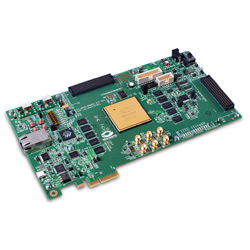
Microsemi has announced the launch of the RTG4 development kit with the recently announced RTG4 PROTO Field Programmable Gate Array (FPGA).
As the industry's first radiation-tolerant FPGA kit that provides a comprehensive evaluation and design platform for space designers, this new kit is ideal for application development using the company's RTG4 radiation-for data transmission, serial connection, bus interface, and high-speed design. Tolerant high-speed FPGA.
The new kit includes Microsemi's RTG4 PROTO FPGA, which enables low-cost prototyping and design verification, while providing the only reprogrammable prototyping solution of its kind, providing the same timing and power characteristics as space vehicles. This development kit provides all the necessary references to quickly evaluate and adopt RTG4 technology without having to build a test board and assemble the device onto the board.
"Our unique RTG4 FPGA brings new features to the space market, and the new development kit with RTG4 PROTO FPGA now provides customers with the reference needed to quickly evaluate and adopt RTG4 technology," said Ken O, director of marketing, space and marketing. 'Neill said. Aviation, Microsemi. "This provides customers with easy-to-design space applications, and we hope this will drive design activities. In addition to demonstrating RTG4 capabilities, the new platform also emphasizes intellectual property (IP) performance and interaction with Microsemi's comprehensive space solution portfolio. Operability. "
The RTG4 development kit board has an RT4G150 device that provides more than 150,000 logic elements in a 1657-pin ceramic package. Its reprogrammable flash configuration is unique to the aerospace industry, making prototyping faster and easier than other radiation-resistant FPGAs. The kit also features Microsemi's Libero SoC Design Suite, which has comprehensive, easy-to-learn, and easy-to-use development tools that can be designed with Microsemi's radiation-resistant FPGAs to increase productivity. The suite integrates industry-standard Synopsys SynplifyPro synthesis and Mentor Graphics ModelSim simulation, and has first-class constraint management, debugging capabilities, and secure production programming support.
Steve Parkes, Managing Director, STAR-Dundee, UK, added, "As an aerospace company focused on spacecraft onboard data processing and processing technology, STAR-Dundee is pleased to successfully demonstrate the use of our SpaceWire and SpaceFibre intellectual property (IP) cores. Microsemi's RTG4 development kit. "In RTG4, our SpaceWire IP is now close to 400 megabits per second, while our next-generation SpaceFibre IP runs at a speed of 3.125 Gigabits per second on a single channel and runs on two channels. The speed is 6.25 Gigabits per second. These results clearly demonstrate the excellent communication capabilities of the RTG4, which is an ideal platform for data processing in airborne spacecraft. "
According to Euroconsult's 2015 report entitled "Satellites to be Built and Launched by 2024", more than 60% of satellites will be launched by 2024 compared to the past decade. This increase is mainly driven by the civil administration, as countries with established space will replace and expand their satellite systems in orbit, and more countries will receive their first operational satellite systems.
In addition to satellite applications, Microsemi's RTG4 FPGAs are also well-suited for space launch vehicles, planetary orbiters and landers, and deep space probes. The company said that target users include designers, program managers, system architects and component engineers serving the space market.
 0
0












 Login/Register
Login/Register
 BOM
BOM
 Cart
Cart

